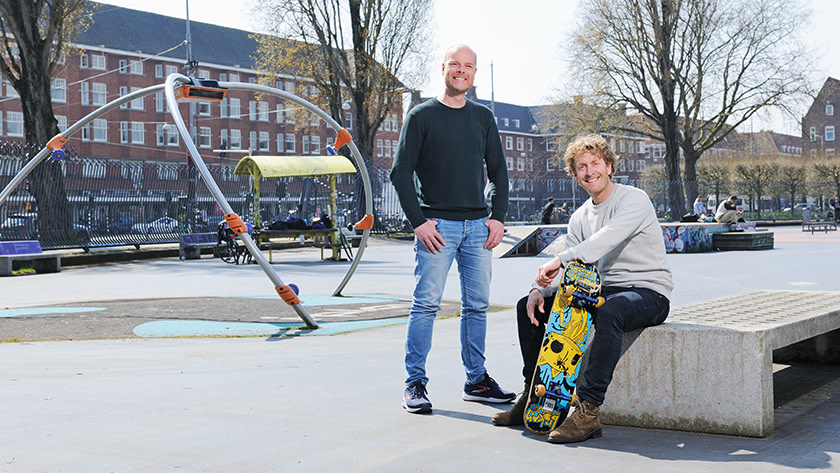New Gimi app makes kids financially resilient


In the Netherlands, one in five young people between the ages of eighteen and twenty-six can’t pay their bills, says Nibud. And while ABN AMRO is supporting this group with its budget coaches, prevention at a much earlier stage is far better than cure. Now a fun, new app called Gimi is helping young children, supervised by their parents, become financially literate.
How do you teach kids the value of money, saving and budgeting when most don’t even get their pocket money in cash any more? One outcome is that money has become less physical and concrete for these youngsters. Research conducted by ABN AMRO shows that although parents would like to make money management a structural part of parenting, they admit it’s a real challenge in everyday life. As a result, money tends to come up only on an ad hoc basis – when a child wants to buy something, for example.
Rising prices
Unfortunately, this could lead to issues later on. Children who have missed out on early life lessons about money may run an increased risk of developing financial problems once they’ve flown the nest. “Many young people are struggling to pay their bills,” says Jeroen Bleijerveld, e-commerce and consumer engagement team lead. “And the problem has worsened in recent years as a result of the pandemic, inflation and rising energy prices.”
ABN AMRO is there for this young target group, Jeroen emphasises: “As a bank, we feel we have an obligation to facilitate financial literacy. Obviously, our role is not to tell people how to manage their money, since parents feel that’s their responsibility – and rightly so. But we do want to support this group and give them the resources to help them become financially literate.”
Checking their bank balance
That’s why ABN AMRO has teamed up with the Swedish firm Gimi to launch a financial literacy app designed specifically for kids. The app lets them check their bank balance and communicate with their parents about the chores or odd jobs they earn money with, for instance. It also features educational quizzes and games. Children can even set savings goals for themselves and track their progress. One thing is not, however, is a mobile banking app, as it can’t be used to make payments.
Gimi was launched in the Netherlands in March 2022 as a pilot project in which 3,000 clients took part. It was so successful that the app is now being rolled out to the general public. With some 3,000 current users, the app is available to all children in the Netherlands, regardless of whether they bank with ABN AMRO. Those who do can link their bank account with the app free of charge.
“The results of the pilot are encouraging,” says Bart Verboom, new business and partnerships team lead at ABN AMRO. “Figures show that kids check their balance five times a week on average. This makes them aware of the money they have on their account. It gives them a sense of pride and responsibility.”
Hot dogs
The games in the app were designed based on scientific data compiled in collaboration with a leading Swedish higher education institution and have been assessed against the financial literacy recommendations of the Dutch Institute for Family Finance Information (Nibud). “That’s important, since it’s how we know for sure that youngsters are getting the right message,” says Bart. “The app helps children internalise the value of money and understand proportional amounts. In one of the games, for example, kids have to guess how much a certain product costs or how many hot dogs they can buy for the price of a pair of jeans.”
Using the app, children can make agreements with their parents about earning money by doing chores or odd jobs, and even upload photos for them to sign off on once they’ve completed a task. “This type of interaction really gets the ball rolling when it comes to talking about money together,” says Bart.
“When it comes to managing money, you can tell kids what they need to know, or you can show them,” Jeroen adds. “That’s all well and good, but children actually learn more effectively by doing things themselves.”
An ambitious target
Ultimately, the bank hopes the app will help curb money problems among these children once they’re older. Jeroen says that’s why ABN AMRO has set itself an “ambitious target”, of reaching one-third of its clients in the 8–13 age group with the app over the next three years.
“We don’t yet know for sure whether we’ll manage to help these kids avoid financial difficulties simply by handing them an app. In fact, we won’t know the answer to that for another ten or fifteen years. What we do know for sure, though, is that Gimi is a fun, effective tool for boosting these youngsters’ financial resilience.”
Bart sums up, “That’s exactly why we’ve made the app available to everyone, not just to ABN AMRO’s own clients. After all, the bank’s purpose is ‘Banking for better, for generations to come’, which means that we at the bank have a responsibility to the whole of society, especially to future generations. The Gimi app is helping us to fulfil that purpose, based on our own expertise as a bank.”